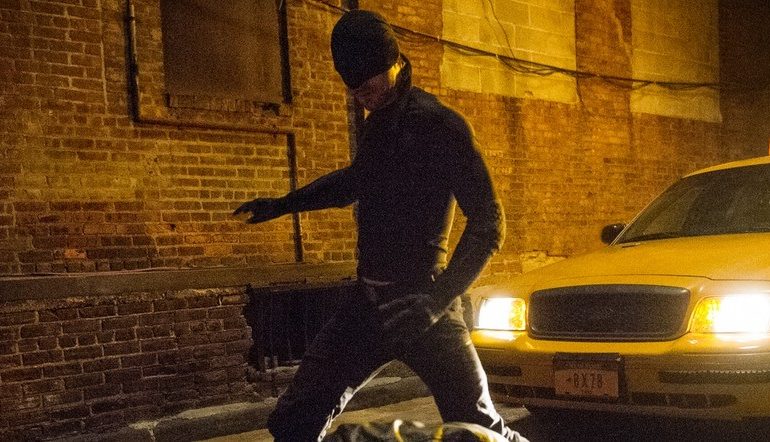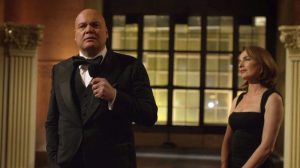My Favorite Character in Marvel’s Daredevil
I don’t need to tell you how good Netflix’s Daredevil is. Plenty of others before me have already done that. I’m going to talk instead about my favorite character, one who best represents how a slight character change made in the adaptation from comics to TV can make all the difference in elevating that character to something new and better.
Warning: Spoilers ahead for Daredevil. If you haven’t watched the entire series, go rate some kittens instead. Or go, you know, finish the series. This post will still be here once you’re done.
Ready? Good.
The villans drew me in to Daredevil.
Sure, superhero shows are ostensibly about the heroes; however, some of the best characters of the last fifteen years have been supervillains. Heath Ledger’s Joker is at the top for amazing portrayals, but I would add to that list Ian McKellen’s Magneto and even Thomas Hayden Church’s Sandman. These characters are rich in depth, whether they’re an anarchist (Joker), haunted by their past (Magneto) or simply in the wrong place at the wrong time (Sandman). Giving the bad guy a sad backstory is a tricky line to walk. One misstep and you’re humanizing Michael Meyers. Daredevil avoids the Halloween pitfall by humanizing Wilson Fisk/Kingpin just enough. Sure, Kingpin had a bad childhood, but that’s only a part of his personality. Vincent D’Onofrio plays Kingpin with such subtly, grace and barely contained rage that everyone who was hoping for an Emmy this year can give up hope right now.
As amazing as D’Onofrio’s performance is; however, he wasn’t the villain that drew me in to the series and isn’t my favorite character. That honor goes to Vanessa Marianna (Ayelet Zurer), Fisk’s girlfriend. In a series packed with interesting characters, I find Vanessa the most intriguing. Here is a pretty successful woman who not only falls for the main bad guy, but does know knowing fully what kind of man he is. Vanessa is given several opportunities to leave Fisk, yet each time she refuses. Why? What kind of person would do what she does? It’s a question I kept asking myself with each episode, as Vanessa got deeper into Fisk’s world, even as her life became increasingly in danger.
Having read only a few Daredevil comics, I did some research before writing this article. (And by research, I mean I fell into a Wikihole for a half hour.) I learned two things during my time on Wiki. First, Vanessa is based on Vanessa Fisk, comic-book Kingpin’s wife. Second, and more important, comic-book Vanessa doesn’t approve of her husband’s actions. But show Vanessa does.
Vanessa’s motivations are a major departure from the comics, but those changes make her character so much more compelling. Vanessa isn’t some trophy wife; she’s a fully fledged character, one with aspirations and goals that sometimes run contrary to Fisk’s. And that’s okay; her character changes also make D’Onofrio’s Fisk that much more compelling. Here is a villain who can crush a man’s head in a car door, but is subdued, almost meek, when it comes to his girlfriend. Vanessa quickly becomes part of his inner circle, making him behave differently toward her than he does with his underlings. The scenes between Fisk and Vanessa are some of the most intriguing parts of Daredevil, because to date, I’ve never seen a woman quite like Vanessa in comic-book shows before.
Adapting material for movies or television is always tricky. There’s a million different things to get right (tone, characterization, plots), and a million different ways to get it wrong. Adaptations are rarely 100% faithful to the source material, and although I had high hopes after the success of the Harry Potter franchise that shows would more closely follow their source material, directors and TV showrunners all seem intent on making as many changes as possible as they adapt books to the screen. Sometimes these changes are minor (like the removal of a few characters in Ender’s Game). Other times the changes are drastic (like damn near everything about Season 5 of Game of Thrones). Changes must happen; blindly faithful book adaptations are how we end up with so many bad Ayn Rand movies.
But changes must serve the story in some logical way. In Daredevil’s case, the showrunners changed Vanessa’s character for the better, all by simply switching her motivation around. “What if Vanessa wasn’t disgusted by Fisk’s activities?” May seem like a minor hypothetical question, but its execution created a compelling, rich character I’m looking forward to seeing more of in Season 2.







